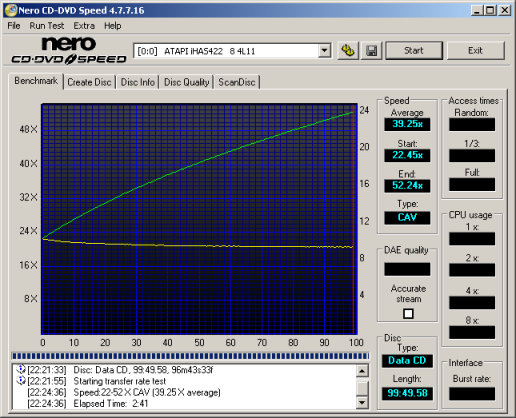While CPU, memory, OS and other variables don't often make a huge difference, there are some nonetheless. We have a computer that is used only for testing hardware. We do this so all tests can be compared reliably.
Test System:
| CPU: | AMD Athlon 64 X2 4600+ 2.4GHz | |
| Motherboard: | ASUS M2N-SLI Deluxe with BIOS 0304 | |
| Memory: | Corsair TWIN2X2048-6400 | |
| Video Card: | MSI NX7900GT-T2D256E - ForceWare v93.71 | |
| Hard Drive: | Seagate Barracuda 7200.10 SATA 3.0Gb/s 320GB | |
| Operating System: | Windows XP SP2 - NVIDIA nForce v9.16 |
For DVD writers the performance tests are broken down into four sections: CD read, CD write, DVD read and DVD write tests. Each benchmark test has been run three times. The score given is an average of the three. DMA has been enabled in device manager for all IDE devices supporting it.
CD Read Tests: For the read performance section of the CD-ROM benchmarks, CD WinBench 99 and CD Speed are used to test transfer speeds, seek times and CPU usage. For DAE testing, CD Speed is used to give an overall speed rating and is used in combination with CD DAE to see how well a drive reads scratched and dirty discs.
CD Write Tests: To test the write speeds, Nero Burning Rom is used to write 700MB to our test media. Times are recorded. To test rewrite scores, Nero is used again to time how long it takes to write 400MB of random files and directories. Then Roxio's Drag-to-Disc is used to test packet writing speeds. The same files are copied and pasted in Windows Explorer and timed.
DVD Read Tests: For the read performance section of the DVD benchmarks, CD Speed is used to test read speeds, seek times, and CPU usage.
DVD Write Tests: To test the DVD write speeds, Nero Burning Rom is used to write a 4.38GB image to our test media. Times are recorded. Then Roxio's Drag-to-Disc is used to test packet writing speeds. For this, 4GB of random files and directories are copied and pasted in Windows Explorer and timed.
CD Winbench 99 Scores:
| Lite-On iHAS422 |
Optiarc AD-7240S |
Samsung SH-S223Q |
LG GH22LP20 |
|
| CD Winbench 99 | 1900 KB/sec | 1575 KB/sec | 2160 KB/sec | 2047 KB/sec |
| Transfer Rate: Inside | 2690 KB/sec | 2780 KB/sec | 3070 KB/sec | 3170 KB/sec |
| Transfer Rate: Outside | 6420 KB/sec | 6360 KB/sec | 6450 KB/sec | 6470 KB/sec |
| Random Access Time | 96ms | 146ms | 87ms | 93ms |
| CPU Utilization | 3.43% | 1.97% | 3.54% | 4.27% |
The CD Winbench test is as close as we can get to testing every day usage. It fires off eight different applications using scripts. This tries to mimic the activities of a person loading these programs onto their own computer.
Lite-On's new DVD writer gave us some mixed performance in our CD Winbench tests. While the iHAS422's overall score wasn't as high as some of the other drives, its transfer rates were fairly good. It started reading at about 17.9x (2690 / 150) and quickly accelerated, reaching a maximum speed of 42.8x (6420 / 150).
CD Speed v4.7.7.16 - Pressed CD:
For this test I used a pressed CD containing one Mode 1 data track. The disc is 74:38 in size and is full of data and directories.
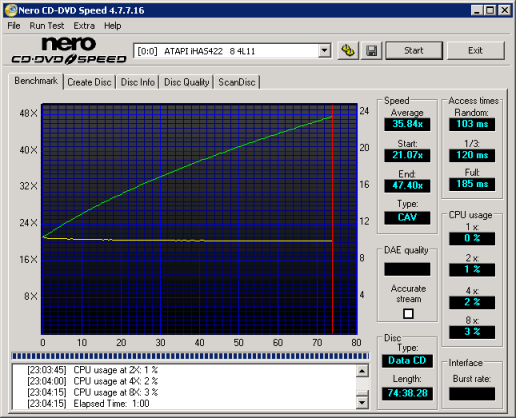
| Lite-On iHAS422 |
Optiarc AD-7240S |
Samsung SH-S223Q |
LG GH22LP20 |
|
| Transfer Speed Average: Start: End: |
35.84x 21.07x 47.40x |
35.51x 20.37x 46.95x |
35.98x 20.97x 47.60x |
35.59x 20.56x 47.15x |
| Seek Times Random: 1/3: Full: |
103ms 121ms 185ms |
151ms 164ms 259ms |
101ms 106ms 176ms |
101ms 107ms 171ms |
| CPU Usage 1x: 2x: 4x: 8x: |
0% 1% 2% 3% |
19% 1% 2% 3% |
0% 1% 1% 3% |
0% 1% 2% 4% |
The iHAS422 didn't perform as well as I had expected when reading pressed CD's. While rated at 48x, Lite-On's new drive came up a little short of this number in our tests. On a more positive note, the iHAS422's seek times were fairly good.
CD Speed v4.7.7.16 - CD-R Media:
For this test I made a copy of our pressed test CD. I used 12x rated Memorex Gold 74 minute media for the tests.
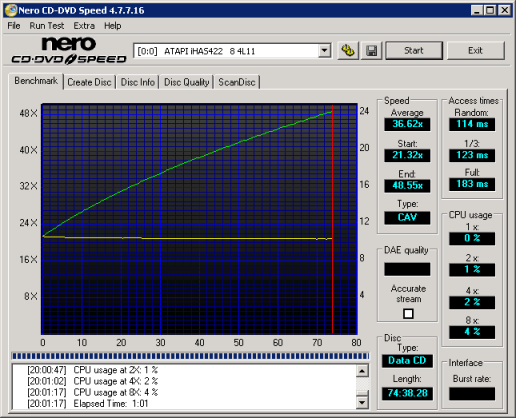
| Lite-On iHAS422 |
Optiarc AD-7240S |
Samsung SH-S223Q |
LG GH22LP20 |
|
| Transfer Speed Average: Start: End: |
36.62x 21.32x 48.55x |
36.26x 20.72x 48.04x |
31.31x 18.09x 41.48x |
36.36x 20.74x 48.20x |
| Seek Times Random: 1/3: Full: |
115ms 122ms 184ms |
154ms 187ms 260ms |
97ms 106ms 174ms |
102ms 111ms 175ms |
| CPU Usage 1x: 2x: 4x: 8x: |
0% 1% 2% 4% |
20% 1% 2% 4% |
0% 1% 2% 4% |
0% 1% 2% 4% |
The iHAS422 was a little faster when reading CD-R media. Thanks to this small speed boost, it had no problems reaching a maximum transfer speed of 48x in our tests.
Lite-On's new DVD writer had no problems recognizing our 99 minute CompUSA media. The iHAS422 read our test disc from start to finish, reaching a maximum transfer speed of 52.24x.
CD Speed v4.7.7.16 - CD-RW Media:
For this test I made a copy of a pressed test CD. I used some PNY 80 minute CD-RW media for the tests.
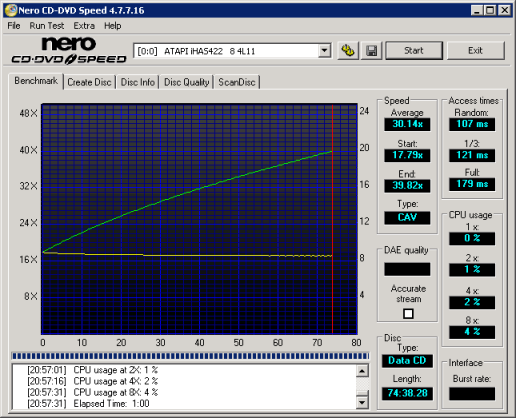
| Lite-On iHAS422 |
Optiarc AD-7240S |
Samsung SH-S223Q |
LG GH22LP20 |
|
| Transfer Speed Average: Start: End: |
30.14x 17.79x 39.82x |
30.72x 17.76x 40.01x |
30.76x 18.08x 40.63x |
31.25x 18.11x 41.29x |
| Seek Times Random: 1/3: Full: |
107ms 121ms 179ms |
154ms 183ms 258ms |
97ms 102ms 175ms |
102ms 111ms 171ms |
| CPU Usage 1x: 2x: 4x: 8x: |
0% 1% 2% 4% |
13% 1% 2% 4% |
0% 1% 2% 3% |
0% 1% 2% 4% |
Like the other drives, the iHAS422 reads CD-RW media at only 40x. As you can see, the drive came very close to reaching this speed in our tests.
CD DAE and CD Speed v4.7.7.16 (DAE) - Pressed CD:
For this test I used Pure Funk. The CD is almost exactly 74 minutes. This helps to squeeze the maximum performance out of the CD.

Exact Audio Copy can tell us a lot about a drive's capabilities. You can see from the screen shot that while the Lite-On iHAS422 supports accurate stream and has the ability to retrieve C2 error information from the CD, it does not cache audio data.

| CD Speed | Lite-On iHAS422 |
Optiarc AD-7240S |
Samsung SH-S223Q |
LG GH22LP20 |
| Average: Start: End: DAE Quality: Accurate Stream: |
36.19x 20.90x 47.83x 10 Yes |
30.63x 17.71x 40.01x 10 Yes |
30.66x 17.73x 40.44x 10 Yes |
31.44x 18.21x 41.56x 10 Yes |
The iHAS422 did very well in our DAE tests. With a maximum speed of 47.74x, it had no problems taking the top spot in our tests.
CD DAE and CD Speed v4.7.7.16 (DAE) - CD-R Media:
For this test I used a copy of the Pure Funk CD. It's burned onto the same Memorex Gold 74 minute media I used in the CD Speed tests.
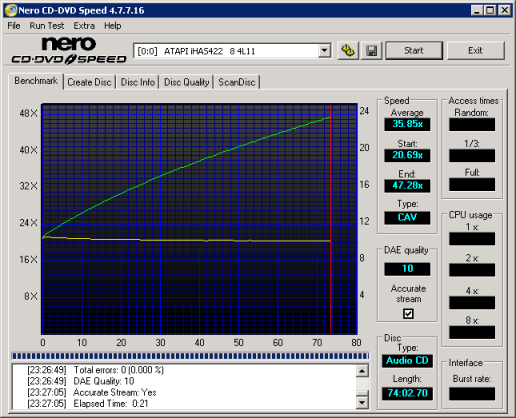
| CD Speed | Lite-On iHAS422 |
Optiarc AD-7240S |
Samsung SH-S223Q |
LG GH22LP20 |
| Average: Start: End: DAE Quality: Accurate Stream: |
35.85x 20.69x 47.28x 10 Yes |
30.92x 17.85x 40.87x 10 Yes |
30.94x 17.74x 40.90x 10 Yes |
31.15x 18.15x 41.04x 10 Yes |
The iHAS422 was a little slower when extracting audio from CD-R media. While the drive still performed relatively well, it reached a maximum DAE speed of only 47.28x. So how did it do in CD Speed's advanced DAE tests? Take a look below.

Lite-On's new DVD writer completed CD Speed's advanced DAE tests with an average score of 34.20x. The drive had no problems passing all of the on-the-fly tests and did not create any errors. If you look at the advanced features, you can see that the iHAS422 was able to read the CD-Text and subchannel data but failed to read the lead in and lead out sections of the CD.
To see how well the iHAS422 can read scratched and dirty discs, I used CD Speed's ScanDisc utility to see how many sectors were damaged or unreadable. This is a very rough, but good way to test the drive's error correcting abilities.
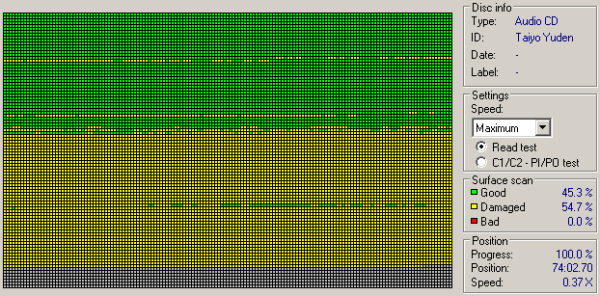
CD Speed - ScanDisc
The iHAS422 handled scratched discs relatively well. By looking at the screenshot, you can see that the drive considered only 54.7% of the CD to be "damaged." More importantly, none of the sectors on the disc were unreadable.
You can also get an idea of how well the drive can read scratched and dirty discs by using CD DAE. The application extracts the audio tracks twice and then compares them. From this information we can see what the drive's average speed was and how many errors it generated.
| CD DAE | Avg. Speed | Errors | % of Disc |
|
Lite-On iHAS422 |
2.9x | 2704526 | 0.35% |
|
Optiarc AD-7240S |
11.6x | 2796031 | 0.36% |
|
Samsung SH-S223Q |
23.3x | 1332069 | 0.17% |
|
LG GH22LP20 |
28.2x | 613565 | 1.71% |
The iHAS422 gave us some mixed results in this test. While the number of errors was fairly low, the scratches on the disc caused it to slow down considerably.


